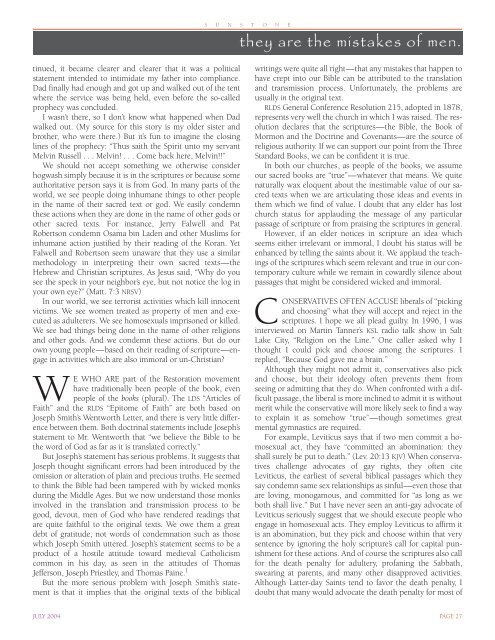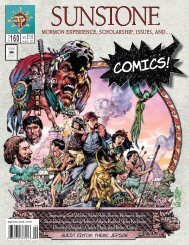is there a place for heavenly mother in mormon theology?
is there a place for heavenly mother in mormon theology?
is there a place for heavenly mother in mormon theology?
You also want an ePaper? Increase the reach of your titles
YUMPU automatically turns print PDFs into web optimized ePapers that Google loves.
S U N S T O N E<br />
they are the m<strong>is</strong>takes of men.<br />
t<strong>in</strong>ued, it became clearer and clearer that it was a political<br />
statement <strong>in</strong>tended to <strong>in</strong>timidate my father <strong>in</strong>to compliance.<br />
Dad f<strong>in</strong>ally had enough and got up and walked out of the tent<br />
where the service was be<strong>in</strong>g held, even be<strong>for</strong>e the so-called<br />
prophecy was concluded.<br />
I wasn’t <strong>there</strong>, so I don’t know what happened when Dad<br />
walked out. (My source <strong>for</strong> th<strong>is</strong> story <strong>is</strong> my older s<strong>is</strong>ter and<br />
brother, who were <strong>there</strong>.) But it’s fun to imag<strong>in</strong>e the clos<strong>in</strong>g<br />
l<strong>in</strong>es of the prophecy: “Thus saith the Spirit unto my servant<br />
Melv<strong>in</strong> Russell . . . Melv<strong>in</strong>! . . . Come back here, Melv<strong>in</strong>!!”<br />
We should not accept someth<strong>in</strong>g we otherw<strong>is</strong>e consider<br />
hogwash simply because it <strong>is</strong> <strong>in</strong> the scriptures or because some<br />
authoritative person says it <strong>is</strong> from God. In many parts of the<br />
world, we see people do<strong>in</strong>g <strong>in</strong>humane th<strong>in</strong>gs to other people<br />
<strong>in</strong> the name of their sacred text or god. We easily condemn<br />
these actions when they are done <strong>in</strong> the name of other gods or<br />
other sacred texts. For <strong>in</strong>stance, Jerry Falwell and Pat<br />
Robertson condemn Osama b<strong>in</strong> Laden and other Muslims <strong>for</strong><br />
<strong>in</strong>humane action justified by their read<strong>in</strong>g of the Koran. Yet<br />
Falwell and Robertson seem unaware that they use a similar<br />
methodology <strong>in</strong> <strong>in</strong>terpret<strong>in</strong>g their own sacred texts—the<br />
Hebrew and Chr<strong>is</strong>tian scriptures. As Jesus said, “Why do you<br />
see the speck <strong>in</strong> your neighbor’s eye, but not notice the log <strong>in</strong><br />
your own eye?” (Matt. 7:3 NRSV)<br />
In our world, we see terror<strong>is</strong>t activities which kill <strong>in</strong>nocent<br />
victims. We see women treated as property of men and executed<br />
as adulterers. We see homosexuals impr<strong>is</strong>oned or killed.<br />
We see bad th<strong>in</strong>gs be<strong>in</strong>g done <strong>in</strong> the name of other religions<br />
and other gods. And we condemn these actions. But do our<br />
own young people—based on their read<strong>in</strong>g of scripture—engage<br />
<strong>in</strong> activities which are also immoral or un-Chr<strong>is</strong>tian?<br />
WE WHO ARE part of the Restoration movement<br />
have traditionally been people of the book, even<br />
people of the books (plural). The LDS “Articles of<br />
Faith” and the RLDS “Epitome of Faith” are both based on<br />
Joseph Smith’s Wentworth Letter, and <strong>there</strong> <strong>is</strong> very little difference<br />
between them. Both doctr<strong>in</strong>al statements <strong>in</strong>clude Joseph’s<br />
statement to Mr. Wentworth that “we believe the Bible to be<br />
the word of God as far as it <strong>is</strong> translated correctly.”<br />
But Joseph’s statement has serious problems. It suggests that<br />
Joseph thought significant errors had been <strong>in</strong>troduced by the<br />
om<strong>is</strong>sion or alteration of pla<strong>in</strong> and precious truths. He seemed<br />
to th<strong>in</strong>k the Bible had been tampered with by wicked monks<br />
dur<strong>in</strong>g the Middle Ages. But we now understand those monks<br />
<strong>in</strong>volved <strong>in</strong> the translation and transm<strong>is</strong>sion process to be<br />
good, devout, men of God who have rendered read<strong>in</strong>gs that<br />
are quite faithful to the orig<strong>in</strong>al texts. We owe them a great<br />
debt of gratitude, not words of condemnation such as those<br />
which Joseph Smith uttered. Joseph’s statement seems to be a<br />
product of a hostile attitude toward medieval Catholic<strong>is</strong>m<br />
common <strong>in</strong> h<strong>is</strong> day, as seen <strong>in</strong> the attitudes of Thomas<br />
Jefferson, Joseph Priestley, and Thomas Pa<strong>in</strong>e. 1<br />
But the more serious problem with Joseph Smith’s statement<br />
<strong>is</strong> that it implies that the orig<strong>in</strong>al texts of the biblical<br />
writ<strong>in</strong>gs were quite all right—that any m<strong>is</strong>takes that happen to<br />
have crept <strong>in</strong>to our Bible can be attributed to the translation<br />
and transm<strong>is</strong>sion process. Un<strong>for</strong>tunately, the problems are<br />
usually <strong>in</strong> the orig<strong>in</strong>al text.<br />
RLDS General Conference Resolution 215, adopted <strong>in</strong> 1878,<br />
represents very well the church <strong>in</strong> which I was ra<strong>is</strong>ed. The resolution<br />
declares that the scriptures—the Bible, the Book of<br />
Mormon and the Doctr<strong>in</strong>e and Covenants—are the source of<br />
religious authority. If we can support our po<strong>in</strong>t from the Three<br />
Standard Books, we can be confident it <strong>is</strong> true.<br />
In both our churches, as people of the books, we assume<br />
our sacred books are “true”—whatever that means. We quite<br />
naturally wax eloquent about the <strong>in</strong>estimable value of our sacred<br />
texts when we are articulat<strong>in</strong>g those ideas and events <strong>in</strong><br />
them which we f<strong>in</strong>d of value. I doubt that any elder has lost<br />
church status <strong>for</strong> applaud<strong>in</strong>g the message of any particular<br />
passage of scripture or from pra<strong>is</strong><strong>in</strong>g the scriptures <strong>in</strong> general.<br />
However, if an elder notices <strong>in</strong> scripture an idea which<br />
seems either irrelevant or immoral, I doubt h<strong>is</strong> status will be<br />
enhanced by tell<strong>in</strong>g the sa<strong>in</strong>ts about it. We applaud the teach<strong>in</strong>gs<br />
of the scriptures which seem relevant and true <strong>in</strong> our contemporary<br />
culture while we rema<strong>in</strong> <strong>in</strong> cowardly silence about<br />
passages that might be considered wicked and immoral.<br />
CONSERVATIVES OFTEN ACCUSE liberals of “pick<strong>in</strong>g<br />
and choos<strong>in</strong>g” what they will accept and reject <strong>in</strong> the<br />
scriptures. I hope we all plead guilty. In 1996, I was<br />
<strong>in</strong>terviewed on Mart<strong>in</strong> Tanner’s KSL radio talk show <strong>in</strong> Salt<br />
Lake City, “Religion on the L<strong>in</strong>e.” One caller asked why I<br />
thought I could pick and choose among the scriptures. I<br />
replied, “Because God gave me a bra<strong>in</strong>.”<br />
Although they might not admit it, conservatives also pick<br />
and choose, but their ideology often prevents them from<br />
see<strong>in</strong>g or admitt<strong>in</strong>g that they do. When confronted with a difficult<br />
passage, the liberal <strong>is</strong> more <strong>in</strong>cl<strong>in</strong>ed to admit it <strong>is</strong> without<br />
merit while the conservative will more likely seek to f<strong>in</strong>d a way<br />
to expla<strong>in</strong> it as somehow “true”—though sometimes great<br />
mental gymnastics are required.<br />
For example, Leviticus says that if two men commit a homosexual<br />
act, they have “committed an abom<strong>in</strong>ation: they<br />
shall surely be put to death.” (Lev. 20:13 KJV) When conservatives<br />
challenge advocates of gay rights, they often cite<br />
Leviticus, the earliest of several biblical passages which they<br />
say condemn same sex relationships as s<strong>in</strong>ful—even those that<br />
are lov<strong>in</strong>g, monogamous, and committed <strong>for</strong> “as long as we<br />
both shall live.” But I have never seen an anti-gay advocate of<br />
Leviticus seriously suggest that we should execute people who<br />
engage <strong>in</strong> homosexual acts. They employ Leviticus to affirm it<br />
<strong>is</strong> an abom<strong>in</strong>ation, but they pick and choose with<strong>in</strong> that very<br />
sentence by ignor<strong>in</strong>g the holy scripture’s call <strong>for</strong> capital pun<strong>is</strong>hment<br />
<strong>for</strong> these actions. And of course the scriptures also call<br />
<strong>for</strong> the death penalty <strong>for</strong> adultery, profan<strong>in</strong>g the Sabbath,<br />
swear<strong>in</strong>g at parents, and many other d<strong>is</strong>approved activities.<br />
Although Latter-day Sa<strong>in</strong>ts tend to favor the death penalty, I<br />
doubt that many would advocate the death penalty <strong>for</strong> most of<br />
JULY 2004 PAGE 27
















